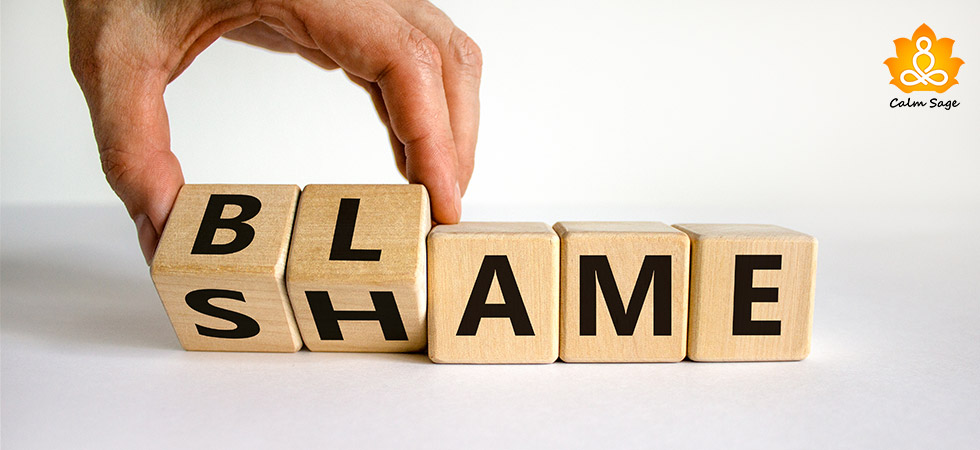Understanding The Psychology Of Shame: Dangerous Or Concealing?

We often feel dishonoured, worthless, immoral, or improper… all these feelings are connected to one strong emotion…shame. Shame is a strong feeling followed by embarrassment or disgrace.
Well, are you currently trying to hide your feelings, especially those feelings which make you feel ashamed? If yes, it’s time to acknowledge your feelings, identify your inner strengths, and work on this negative emotion to live life peacefully.
Shame is chronic, progressing, and negative to live with! One thing that shame teaches us is that we start focusing on our inner-self or we start focusing on the feelings of others. Consecutively, we start taking concrete actions that somewhere make us responsible. In this blog, let us explore the psychology of shame, the psychological effects of shame, and how to cope with shame. So, let’s get started.
Understanding Shame From a Psychological Viewpoint
Shame is a negative emotion followed by humiliation or embarrassment that arises from feelings of being immoral, worthless, improper, and whatnot. However, from a psychological viewpoint, shame plays an important role in survival as human beings.
If we look at the positive side of shame, without understanding the consequences of shame, we might not adhere to social norms, we might not follow the rules, or behave in a certain way that empowers us. Shame is connected to a need to be accepted or it can be considered as a progressing tool that makes us “us.”
However, when shame becomes problematic, it can impact our overall growth as a person, and we might start evaluating ourselves bleakly. This constant inner critic can make you feel like a bad person, invaluable, or worthless. The truth is a shame either makes you a better person or often breaks your worth which keeps on pointing negative things about you.
According to psychology, guilt, shame, embarrassment, and humiliation are different terms with different meanings, impacts, and coping techniques. Therefore, it is really important to understand the differences.
Five Factors That Catalyses Shame
Now, the question is, what situations or factors make us feel ashamed of ourselves? Well, according to psychology, five factors contribute to chronic shame:
1.Self-awareness
Self-awareness is one of the important factors because it is aware of our judgmental sense. It makes us feel that we are in the “spotlight” and whatever we do you’ll always be considered to be “wrong” due to societal norms. For example, suppose you’re attending an office party, everyone is dressed casually and you decide to wear something that reflects your personality, your inner critic will be activated right away and you’re going to feel like everyone is judging you.
2.Self-blame
Self-blame comes when we start making decisions that look good to us but not to society. To make things casual, you might start explaining yourself without assessing the situation. When we start self-blaming ourselves, we are likely to feel guilt and shame.
For example, suppose you’re trying to begin a new relationship and you mistakenly assess their negative traits, consecutively, you will feel guilty or shameful for not focusing on the red flags in the beginning.
3.Self-esteem
Self-esteem is a trait that enhances our uniqueness and brings our real-self. When someone goes through a bad situation, they tend to blame themselves badly, and in some situations, this gets more frequent and repeated.
4.Standards
Our actions, feelings, and thoughts are totally based on our standards or societal norms. When these factors are affected, we tend to experience shame and guilt.
5.Personal trait
People who are conscious about their actions, behaviors, moves, and everything, they are shame-prone.
Types of Shame
Based on the factors, definitions, and impacts, there are various types of shame:
- Chronic Shame: Chronic shame is experienced when someone makes us feel less worthy or invaluable. This type of shame impairs mental health and regular functioning.
- Defeat: Defeat shame is experienced when we are defeated by someone or experience failure. When we expect a win and a loss, it can make us feel more shameful. For example, not getting expected appraisal or promotion at work or losing a sporting match.
- Exclusion: Exclusion shame is experienced when we are excluded from a group or a social setting. This type of shame is generally carried out by the “left out” feelings.” Exclusion can also be experienced with social anxiety.
- Failure or Disappointment: When we fail at something or disappoint someone, we may experience shame. This type of shame is more linked with defeat.
- Healthy Shame: Healthy shame is experienced when someone passes their humor against you and you allow yourself to take it positively. This type of shame is a great teacher as it helps us explore our boundaries and makes us morehumble and positive in life.
- Humiliation: Humiliation is experienced when someone passes critical comments that embarrass us publicly and personally.
- In front of others: When someone passes a judgment or negative comment on your looks in a social setting, you’re more likely to feel ashamed. This type of shame is more connected to humiliation.
- Internalized Shame: Internalised shame is experienced when shame is developed from inward. For example, childhood abuse, violence, or unworthiness can result in internalized shame during adulthood.
- Performance Shame: Performance shame is experienced when we are self-conscious about our public speaking or performing skills.
- Shame Around Strangers: Shame around strangers is experienced when we discover something is wrong with us and it is more connected with social anxiety.
- Shame About Self: Shame about self is experienced when our personality is inferior and someone’s comments or judgments can have long-lasting effects on us.
- Transient Shame: Transient shame happens when we make a mistake, especially in a social setting. Psychologically, this type of shame passes on its own and does not create major problems in life.
- Toxic Shame: Toxic shame is more like internalized shame as it involves an inner critic that keeps on pointing out wrong things that have happened or done. In psychology, toxic shame is considered to be a part of identity.
- Unrequited Love: One-sided love aka unrequited love makes us feel not worthy or invaluable.
- Unwanted Exposure: When we’re humiliated publicly and exposed unwantedly, it can result in unwanted exposure and shame.
Mental Health Impacts of Shame
According to psychology, the mental health impacts of shame can be divided into two main categories:
Short term effects
- Makes you feel flawed and encourages you to become a better version of yourself
- Defensiveness
- Bullying others when you’re compelled by others
- Feeling unworthy or empty
- Reduced self-esteem
- People-pleasing
- Social anxiety
Long-term effects
- Social withdrawal
- Addiction
- Development of a narcissistic personality
- Physical health issues
- Depression or chronic sadness
- Trust issues
- Leads to excessive or compulsive behaviors
- Fear of being judged
- Leads to overachievement or perfectionism
When someone is prone to shame, it can lead to various psychological issues, such as:
- Depression
- Anxiety
- Low self-esteem
- Sociopathy
- Eating disorders
Symptoms of Shame
Below are some of the common symptoms of shame:
- Insensitivity
- Constant worry
- Feeling unappreciated
- Inadequacy
- Regret
- Rejection
- Lack of self-respect
Causes of Shame
Psychologically, there can be various reasons behind the development of shame, such as:
- Bullying
- Childhood trauma
- Feeling inadequate
- Neglect
- Presence of mental health disorder that involves judgment or criticism
- The constant rejection or failed relationships
- Unmatched standards of living
- Unmet expectations or failure
Difference Between Shame and Guilt
As mentioned above, shame and guilt are two different terms with different meanings:
Native AreaThe rainforests of Central and South America
Shame |
Guilt |
|
|
|
|
|
|
Stepping Towards Positivity: How to Cope with Shame
Now that we have understood the psychology of shame, it’s time to overcome or heal from the shame that you’ve been hiding from for so long. The first ever step to healing from shame is to explore your viewpoints. In this blog, let’s explore some effective ways to cope with shame:
-
Explore your viewpoints and identify contributing factors
The first ever step is to explore your viewpoints whenever you’re stuck in a negative or overwhelming position. This step is the most important because it will allow you to self-explore the contributing factors to shame. You can also do it by focusing on your emotions experienced in different situations. You can effectively do this by writing a journal or writing down your feelings related to shame. Try to examine the impact of shame you still feel.
-
Embrace the flexes and create opportunities
After identifying the contributing factors, it’s time to learn and acknowledge your shame so that we can learn from the past and create opportunities today. It’s really necessary to bring those feelings out and step into the positive world. Herein, do not avoid the shame, instead ask yourself different questions so that you can create a safe world for yourself.
-
Accept and move toward positivity
As you allow yourself to heal from the shame, it’s time to reassess your attitude and beliefs related to shame and move towards positivity. It’s high time to set your priorities and make decisions that make you look more resilient.
-
Turn your weaknesses into strengths
Be honest and try to examine what you really are, your personality, your qualities, and your weaknesses to identify your weaknesses and convert them into strengths. To learn how to turn your weaknesses into strengths, refer.
Key Takeaways from the Blog
- Shame is a strong, chronic, and negative emotion.
- There are huge differences between shame and guilt.
- Shame has warning signs and impacts.
- Shame starts developing in childhood.
- Shame can harm your overall well-being.
- We can make shame a self-healing process with the right approach.
I hope this blog helps you understand the psychology of shame and how to heal from shame. Comment down and share your views on the same. For more such content, connect with us on all social media platforms.
Thanks for reading!




















